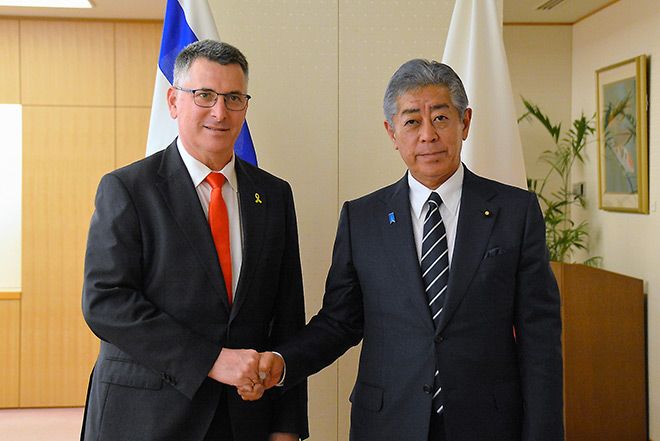The Foreign Ministry took the unusual step of not announcing the meeting between the Japanese and Israeli foreign ministers until three hours before it took place at the ministry building in Tokyo on May 13.
Information about the meeting between Foreign Minister Takeshi Iwaya and Israeli Minister of Foreign Affairs Gideon Sa’ar was strictly controlled and was not shared until the last minute for fear of protests against Israel.
“We took a cautious approach in consideration of safety,” a Foreign Ministry official said.
Sa’ar is visiting Japan for the Osaka Kansai Expo where National Days are a major attraction. At these events, participating nations and regions introduce their history and culture.
Israel is expected to host its own on May 15.
However, a look at the calendar of National Day events on the Japan Association for the 2025 World Exposition’s website reveals the Foreign Ministry is not the only group opting to keep its scheduling murky.
Although nearly every day of the calendar is dotted with a country or organization’s flag, May 15 is empty.
Civilian groups calling for solidarity with Palestine have strongly criticized the date—May 15 falls on the anniversary of the “Nakba” (catastrophe). The forced mass displacement of Palestinians in 1948 due to the establishment of Israel remains a day of mourning and commemoration.
“The designation of this day as a National Day (for Israel) itself is inappropriate,” according to the groups.
‘TWO-STATE’ EMPHASIS
The foreign ministers’ meeting on May 13 lasted about an hour, according to the Foreign Ministry.
Iwaya said at the beginning of the meeting that he was “seriously concerned about the devastating humanitarian situation in the region,” given that the Palestinian death toll has exceeded 52,000.
Sa’ar criticized Hamas and said that Israel will soon achieve its objectives.
Iwaya strongly urged Israel to comply with international laws, including ensuring humanitarian aid, and reiterated the importance of a “two-state solution” where Israel coexists with a future version of the Palestinian state that has gained independence.
He also called for maximum restraint and a peaceful resolution through dialogue by all parties, including Israel, because escalation of the situation would not be in the best interest of the international community as a whole.
According to the Israel Ministry of Foreign Affairs’ website, Sa’ar told Iwaya, “Unilateral action against Israel may provoke an Israeli response, pushing Israel into a corner. I urge Japan to reconsider such ideas, as they will only hinder peace.”
ANXIETY BREEDS INACTION
Regarding Japan’s Middle East diplomacy, the country maintains good relations with both Israel and Arab nations. As Iwaya stressed during the meeting, Japan supports a two-state solution in which Israel and an independent Palestinian state coexist.
In reality, however, the Japanese government has been unable to take proactive action toward resolving the conflict. It cites concerns with the administration of U.S. President Donald Trump, which has a pro-Israel policy.
Japan’s handling of an incident involving the International Criminal Court (ICC) in the Hague, Netherlands, is one example of the government’s unwillingness to defy U.S. leadership.
In February, Trump signed an executive order to sanction ICC staff members. This was in retaliation to the court’s issuance of arrest warrants for Israeli Prime Minister Benjamin Netanyahu and other figures over alleged war crimes and other charges concerning the conflict in Gaza.
Seventy-nine ICC member countries and regions issued a joint statement criticizing the executive order.
Even with Tomoko Akane, a Japanese citizen, serving as the head of the ICC, the Japanese government refrained from taking part in the joint statement to avoid angering Trump and the U.S. side.
Ryoji Tateyama, professor emeritus at the National Defense Academy of Japan who is an expert on Israeli politics, expressed a certain understanding of Japan’s concerns about the Trump administration’s reaction.
“As Trump links various issues, (Japan’s) handling of Middle East diplomacy could spark Japan-U.S. issues such as tariffs and security,” Tateyama said.
However, he went on to say that Japan “should repeatedly call for a peaceful resolution through a two-state solution.”
He added, “Japan, which has called for an international order based on international law, should maintain a consistent position on the ICC issue and appeal to Arab nations and the Global South nations.”


AloJapan.com